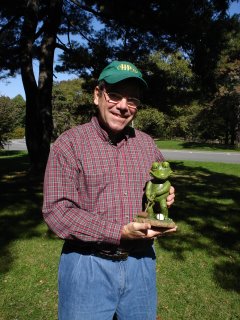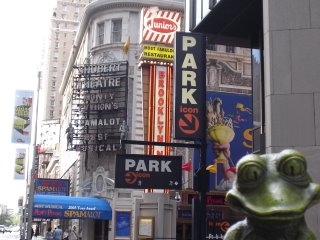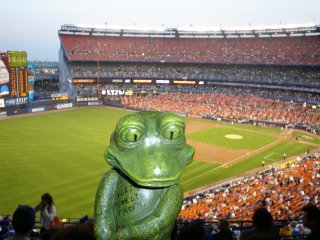(Note: I critique and even praise my own poem here, which is kind of unforgivably self-important and self-indulgent; but I'm always interested in the process of writing and the reasons writers make the choices they do, and it's rare to see these choices discussed step-by-step, so I hope some of you share that interest and will find this interesting in turn. Thanks for your patience.) Last week I posted
two versions of a proto-poem called "At the Corner," which I labelled "An Experiment":
In the rain on Prince Street this eveningI thought I saw someone I'd loved.That is "had loved," in the past tense,as it is all past and no present.But still I felt my heart catchand pull as I looked closer:at an unknown man,not my once-only,and this one far too usual --with a too-loud laugh as I passed himand an umbrella like everyone else's.But I felt the pain of that pull long after,and the sweetness too:my pleasure, still, at his memory,and my sadness it's all I have. This is how it began: It was raining, and I was walking to the subway, thinking my usual on-the-way-to-the-subway thoughts about dinner, and the pretty shoes in the store window, and the work I needed to do when I got home that night. I passed a guy on Houston Street who looked like a man I had dated in the last year; I thought for a moment it was him, and my heart actually physically seemed to thump oddly and hard, and then I realized it wasn't, and I was past him two steps later. But my heart still hurt, as if it were straining to leap out of my body back toward the guy, and trying to articulate this vague and useless ache for my rational mind, I thought the line
I felt my heart catch on his figure.
And while my real heart was still dwelling on the misidentification and real memories of the man and the sadness that went with that, my writing brain thought,
That's a good line. So it started taking notes on how I felt as I moved down into the subway station, and constructing a narrative in which that ache could be communicated to another person. (Annie of
Maud Newton had a similar experience recently:
The Thing that Watches.) I swiped my MetroCard through the gate and let a train go by so I could sit on a bench and write this:
"I was walking down Houston Street in the rain today and I thought I saw someone I'd loved. That is had loved -- in the past tense -- as it didn't work and we're no longer in touch; but still I felt my heart catch on his figure and hold there till I looked closer, my heart thumping . . . It wasn't him, of course, just a random man beneath an umbrella; but still I felt the pain of that tug for minutes after, and the sweetness, too"
At this point another train came and I got on it; but I was thinking about the situation all the way to dinner, both mourning and enjoying the ache. (Of course I knew I was dragging the painful emotion out for my own writerly purposes, but the image of the heart catching was good and interesting enough, and the original emotion real enough, that I didn't mind exploiting it.) And as soon as I reached my destination, I wrote, "my pleasure, still, at his memory, and my sadness that it's all I have." And then I had dinner with company (not a date, I'll note) and let the feeling dissipate.
When I reached home a couple hours later, I typed the lines up and looked them over. And then I more or less did TRUCK #4: I asked myself, "What is this about? What do I want this vignette to do?" The answer was, "It's about that tugging feeling on the sidewalk, and recreating that feeling so you have it captured for yourself and a reader feels it too." Given that, the lines needed to be sharper, tighter, less prosy and more exact; I wasn't yet thinking of it as a possible poem, but I knew "we're no longer in touch" and "random man beneath an umbrella" were the wrong tone of voice for what I wanted. And on a story level, to put the emotions in narrative order, there needed to be the surprise of seeing my ex-dear one, and the second surprise and disappointment of the realization the guy wasn't him; the street guy needed to be shown to be inferior to the real man, and the disappointment had to proved durable. And finally, of course, I had to use that image of my heart catching on him, as that inspired the whole thing in the first place.
So I rewrote, a word here, a phrase there. "Houston" became "Prince Street," which is one block south, for the romantic associations of "Prince" (good eye, Anonymous!) and the tautness of having one syllable versus two. I kept the "tense" line, but tossed out the explanation of the end of the relationship as unimportant -- the only fact relevant to this poem was the lack of him in my life now, and that again felt tighter as "all past and no present," with the absolutes reinforcing the surprise of seeing his face again.
Then, rather than telling the reader about the suspense I felt as I looked closer, I tried to create it by simultaneously tightening and lengthening the pause before discovery: From "I felt my heart catch on his figure and hold there till I looked closer, my heart thumping . . . It wasn't him" to "I felt my heart catch on his image and pull as I looked closer: at an unknown man." When this is read aurally, I hear the pause created by the space after the colon as more abrupt, and therefore louder, than the softer pause that follows the trailing away of an ellipsis (an effect stolen from
"Ozymandias"). More importantly, all the drama is in the looking, not the description of my heart thumping; so the description actually dissipated a little of that drama, by distracting the reader from the mystery of whether
he was
him to the less important issue (narratively, for this moment) of how I felt about it.
Then came the big reveal: Not Him. And I had to make the reader see both the real guy and the ghostly man who I mistook him for, and see why I was disappointed. I confess I remembered very little of the actual guy, as my mind had been filled with
"Is that--? No-- Oh. " So the spirit of James Frey and I invented details -- the laugh, which I plausibly could have heard as I passed by; the umbrella, when in fact I think he didn't carry one. But both were useful as external signifiers of his inferiority to my imaginary man. (I briefly got obsessed with using "an undistinguished umbrella," which expressed precisely the idea that he wasn't special enough, but the alliteration and multiple syllables made the phrase a bit ridiculous, and I didn't want humor at this point in the poem. "Like everyone else's" showed him to be one of the common herd, and contrasted nicely with "once-only" -- another phrase I liked a lot, for the double thought that this was "once," as in "once upon a time," as in "not now," and that he was once my only one, which, since he is "
not my once-only," obviously is no longer true and tangs a bit.) (Rather more in the poem than it usually does in real life, I will say.) And the last lines stayed the same, other than changing "tug" to "pull" for consonance and smoothing "for minutes after" to the more elegant "long after."
Then came the thought that made this an experiment:
This could be a poem. Generally I like the ideas in my infrequent poems, but not the writing in them; I am too prosy and straightforward by nature; I was not born under a poetic planet. (My favorite quote about poetry ever is from Tom Stoppard: "Poetry is the simultaneous compression of language and expansion of meaning.") But I love poetry for just its employment of the subtlety, brevity, and sinuousness I usually lack, and as most poems attempt to pin down an emotion, which was also my goal with this, my paragraph seemed like a worthy candidate for another assault on poetry.
So what would it need to be a poem? Line breaks, to start. I put in a break after every phrase, more or less, and divided the lines into three narrative acts, roughly "situation," "realization," and "reflection." And then the rhythm of each line became especially important; the long and conversational "I was walking on Prince Street this evening in the rain when" became the "In the rain on Prince Street this evening," with the parade of one-syllable words signalling tension, perhaps self-protectiveness; which was then explained by "I thought I saw someone I'd loved." (I think the next two lines about "had loved," still consisting almost entirely of one-syllable words, may be taking this tightness a bit far, to the point that the narrative voice sounds terribly repressed and possibly introduces doubt about the genuineness of the original love; but I haven't figured out whether or how to fix this yet.) I cut "on his figure/image" for the poem to speed into the drama of looking closer, but I kept it in the prose version because it could afford the phrase.
So I continued to fiddle well into the poem version, then went back and changed the prose version to match. By this time I was really hearing the words as the poem, so I put commas in the prose version to match the line breaks -- something I wish I hadn't done now, as it became prose trying to breathe like poetry, rather than following its own rhythm. And then I published it in both versions, to see if other people would respond to it and which version worked better.
Your votes? Six A's (prose), five B's (poem), and two ties. And my own? I'm sorry to say I don't think either one really succeeds in the end. The poem is more satisfying to me for the sound and drama of those line breaks, but the language of it is still terribly prosy -- the words have just one meaning, with no expansion, to use Stoppard's phrasing; or the words don't work hard enough, to use Melinda's comment. And the emotions I listed six paragraphs above? The only one that's really shown, not told, is (ironically, or perhaps significantly) the one with the details I invented, proving the real guy to be less worthy than my imaginary man.
But I am still pleased with it overall, for the individual thoughts and phrases I mentioned above, and because it got enough of that moment to serve as my personal palimpsest of it -- as the guy himself was the palimpsest for my former dear one. The writing not only sharpened the sweetness and sadness, but it distanced those emotions from me too, gave me the control over them as a writer that I didn't have walking down the street. And this, too, is a satisfaction, should that moment happen again: I'll smile still at his memory, and then at knowing I now have more.
_____








